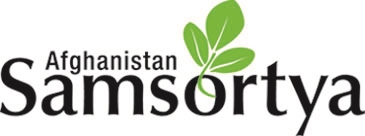Spring 2024 Newsletter
Dear friends,
Happy Spring! I’m glad to be back from another successful trip to Afghanistan marking Afghanistan Samsortya’s twentieth anniversary. As we celebrate this milestone, I’m excited to share some highlights with you and reflect on the impact we’ve made. From our humble beginnings with just a handful of seeds, we have been able to achieve remarkable growth.
We have established four tree nurseries which now support thousands of young saplings, plants, and mother stock for distribution. These nurseries also serve as facilities for demonstration and education for the local community. One of our proudest achievements has been the installation of wells equipped with solar panels to provide clean drinking water to local families. Operating daily from 9am to 4pm, these wells are a sustainable and cost-effective means of cultivating a self-sufficient environment for the local farmers. In the Shamshapur area of Ningrahar province, we funded a hand-dug well to provide clean water to a large extended family. We also dug a 35-meter well to meet the needs of a community of nomads periodically settling in this area.
Samsortya’s commitment to education continues to flourish. We recently graduated sixty students from the health studies scholarship program — fifty of them women. This program includes areas of study in midwifery and general health. Our scholarships create opportunities for graduates to put their acquired knowledge to work within their local communities serving in clinics across remote rural areas and providing essential healthcare services to those in need. During my trip, we accepted seven new extraordinary women into the scholarship program. One standout candidate named Rozana — a young and ambitious woman from Jalalabad — greatly impressed me with her determination.
This planting season, our work greening spaces has included the replanting of trees in public areas such as schools, public meeting halls, and the courtyards of family dwellings. Trees and foliage beautify the landscape, serving to inspire and celebrate the local community, its traditions, and its resilience. We’ve also distributed thousands of fast-growing saplings and varieties of coniferous trees. We grafted hundreds of sour orange trees with grapefruit from our mother stock and plan to distribute these unique saplings next spring. Grafting is a horticulture technique whereby plant tissue is joined together to facilitate growth. It plays a crucial role in our efforts as it allows us to produce unique varieties of trees better suited to the local climate. Other benefits include higher yield and an improved resistance to environmental stress such as drought. The fruits of all this flora include grapefruit, loqat, persimmon, pomegranate, peach, jasmine, grape vines, among other delights!
Over the past two decades, thousands of deras throughout rural Afghanistan have grown out of saplings sourced from Samsortya nurseries. Deras are enclaves of trees typically near country homes and villages in Afghanistan that offer local communities places to gather for various events including celebrations. They have special significance in the Afghan culture as they provide shade, fruit, and respite for the people, livestock, and local wildlife. Kats — traditional handmade, wooden bed structures — are typically placed within deras to offer the locals comfortable seating to be able to relax and enjoy the breeze. Mulberry trees — toot in Pashtu — are beloved in the Afghan tradition as they are the ideal tree for deras growing to great majesty. Their sweet and tart berries can be eaten fresh or dried. I have fond memories as a young girl snacking on the delightful mix of local walnuts and dried mulberries during Kabul’s cold winters.
My parents' wedding was a momentous occasion for our community that continues to be retold even decades later. It was a joyous affair for over 2,500 guests over several days and it took place within a dera in Jalalabad. As a child, I also recall the dera as a place of learning. My father and uncles used the local dera as an informal schoolroom to teach the children of the village a range of subjects from reading to mathematics. In the evenings, the dera would become a gathering point for the community’s intellectuals, poets, and leaders to pursue enlightened conversations and reflection during poetry readings. With its multi-purpose functionality, the dera remains integral to Afghan society and tradition.
As we continue to contribute thousands of trees to deras throughout Afghanistan this planting season, I'm reminded of their enduring cultural significance and practical utility. Their multipurpose functionality reflects Samsortya’s resourcefulness and commitment to sustainable development and cultural preservation.
Additional Milestones This Season:
● The creation of a beautiful park in Kabul's Khairkhana District of three thousand households to serve as a recreation spot for the children and mothers of two local schools. Samsortya added 1,200 trees and plants in this region.
● The upgrade of the irrigation systems for the Kot District where 36 solar panels can now irrigate 200 acres of land with wells providing clean water to nomadic communities.
I am sincerely grateful for the support of our community, both in Afghanistan and around the world. Together, we're making a meaningful difference in the lives of ordinary Afghans and the health of our cherished planet. Thank you for your continued partnership and dedication to our cause.
With love and gratitude,
Mariam
To donate and for more information about how to get involved, visit: www.afghansamsortya.
Afghanistan Samsortya
200 Swanton Street
Unit 418
Winchester, MA 01890
Afghanistan Samsortya is a registered 501(c)(3). All donations made are 100% tax deductible.
